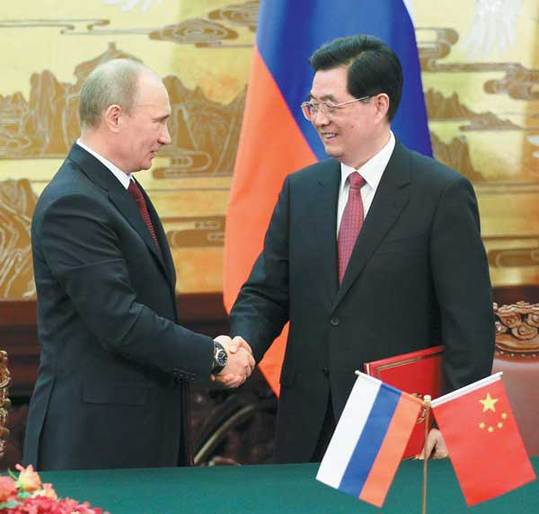China, Russia pledge partnership on trade, Syria
|
 |
|
President Hu Jintao greets his Russian counterpart Vladimir Putin at the Great Hall of the People on Tuesday in Beijing. [Photo by Wu Zhiyi / China Daily] |
China and Russia have signed a slew of commercial deals and promised to oppose foreign intervention in Syria as the two countries' presidents held meeting on Tuesday in Beijing.
The two presidents formed partnership against an uncertain world and regional scenario highlighted by the fluctuating Middle East crisis and shifting Asia-Pacific landscape.
They also urged the international community to support UN envoy Kofi Annan's plan on Syria.
President Hu Jintao threw a lavish red-carpet welcome for Russian President Vladimir Putin, as he kicked off a three-day state visit to China, his first to Asia since commencing an historic third term last month.
During their two-hour meeting, the leaders vowed to increase cooperation in the framework of leading international organizations — the United Nations, G20, BRICS and the Shanghai Cooperation Organization.
Hu said as both countries are in a crucial era of development, they face challenges amid increasing uncertainties in the global arena. Both need to support each other on regional and world affairs to maintain a peaceful global environment, he added.
Putin is on his eighth visit since he first took up the presidency 12 years ago, and he said China is not only a "good friend" but a "good partner on the world platform."
Putin told Hu that ties between the two nations had reached "new heights," with political trust between the two "especially high."
Putin also pledged more cooperation, especially in the military field, with China in the Asia-Pacific region. The region has seen recent changes as the US is re-emphasizing its strategic focus.
Both leaders were determined that Annan's efforts should not be abandoned while the West was increasing pressure on the current Syrian leadership to step down. Syrian rebels said on Monday they were no longer bound by a UN-backed truce, a move that analysts said will trigger greater external intervention from Western powers and increase the possibility of civil war. Both leaders agreed that the international community should support Annan's efforts.
On the Syrian issue, the two heads of state said the international community should continue to support the joint Arab League/UN Special Envoy Annan's mediation efforts and the UN monitoring mission, to promote a political solution to the problem in Syria.
Foreign Ministry spokesman Liu Weimin also said on Tuesday that both Beijing and Moscow opposed foreign intervention or forced regime change in Syria.
"We believe ultimately the Syrian issue should be properly addressed through consultation among different parties in Syria," Liu said.
The leaders are also believed to have covered Iran and the situation on the Korean Peninsula.
Our approach is united and coordinated to solve international crises, Putin told the media after the meeting.
Analysts said China-Russia ties have become a pillar for the Euro-Asia region and world peace.
"China and Russia's cooperation and coordination in a series of international affairs, such as Syria and Iran, have helped lower the risk of major wars," said Sun Changhong, vice-director of the Euro-Asian Social Development Research Institute under the Development Research Center of the State Council, in an online article on Tuesday.
Sergei Markov, vice-president of the Plekhanov Economic University in Moscow and adviser to Putin, said "Russia finds political dialogue with China easier than with our Western counterparts, and Putin believes that Russia and China are two giants that have mutual responsibilities" to take a principled stand for things they jointly believe in.
"It's also a fact that Western economies are in crisis, while Asia is seeing growth. All this justifies the qualitative improvements we are hoping to accomplish in our relationship with China. The importance of our growing cooperation can’t be stressed enough," he was quoted as saying by the Christian Science Monitor in a Monday article.
Putin will also meet the presidents of Iran and Afghanistan during the visit, which comes just weeks after he cancelled a trip to the US.
China and Russia signed more than 10 key commercial contracts on Tuesday, including setting up a $4 billion investment fund.
Putin also said the two countries are speeding up development and research on commercial aircraft and helicopters.
The commercial contracts, which Putin described as "crucial", also include Russia building two nuclear power plants in China, and more cooperation in the electricity, tourism and energy sectors.
The Russian delegation accompanying Putin includes six cabinet members, the heads of Russia's energy giants Gazprom, Rosneft and Transneft, and "all the major names of Russian business", according to the Russian media.
Russian trade with China has risen at least 40 percent year-on-year for the last two years to reach $80 billion last year. Russian officials say that a target of $100 billion in trade by 2015 is likely to be reached ahead of time.
Hu said that the two countries should accelerate high-tech cooperation and pursue strategically important large-scale projects, with policy and capital support from the governments. Observers said the investment fund and the commercial flight projects are the key projects as both China and Russia are upgrading their economic structures.
According to Feng Yujun, a researcher with the China Institute of Contemporary International Relations, the commercial deals show that the two countries are upgrading their bilateral trade, shifting from simple trading of commodities to a comprehensive pattern.

